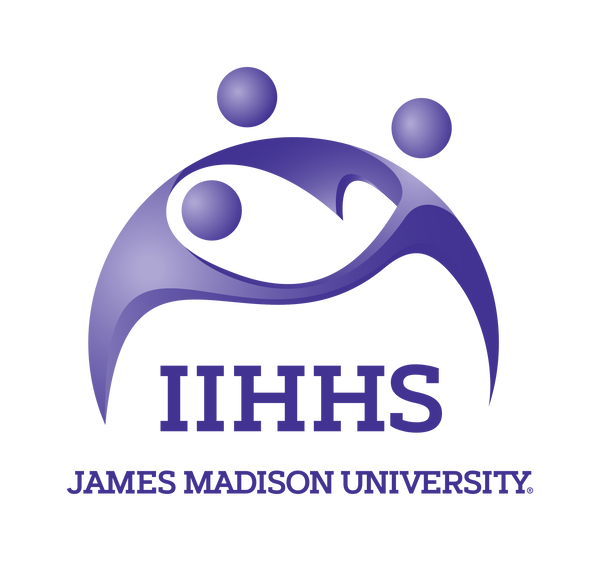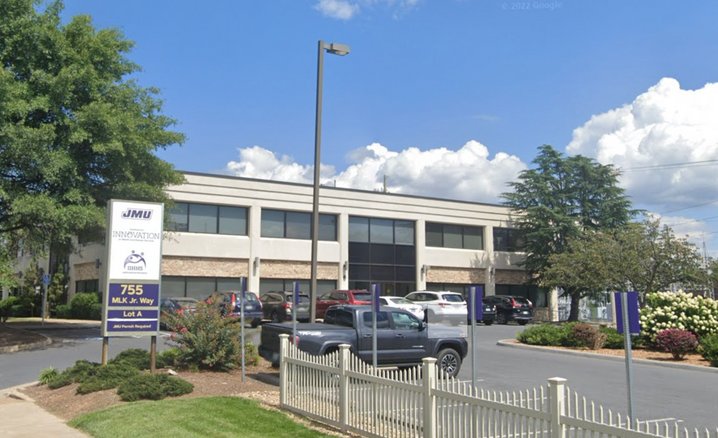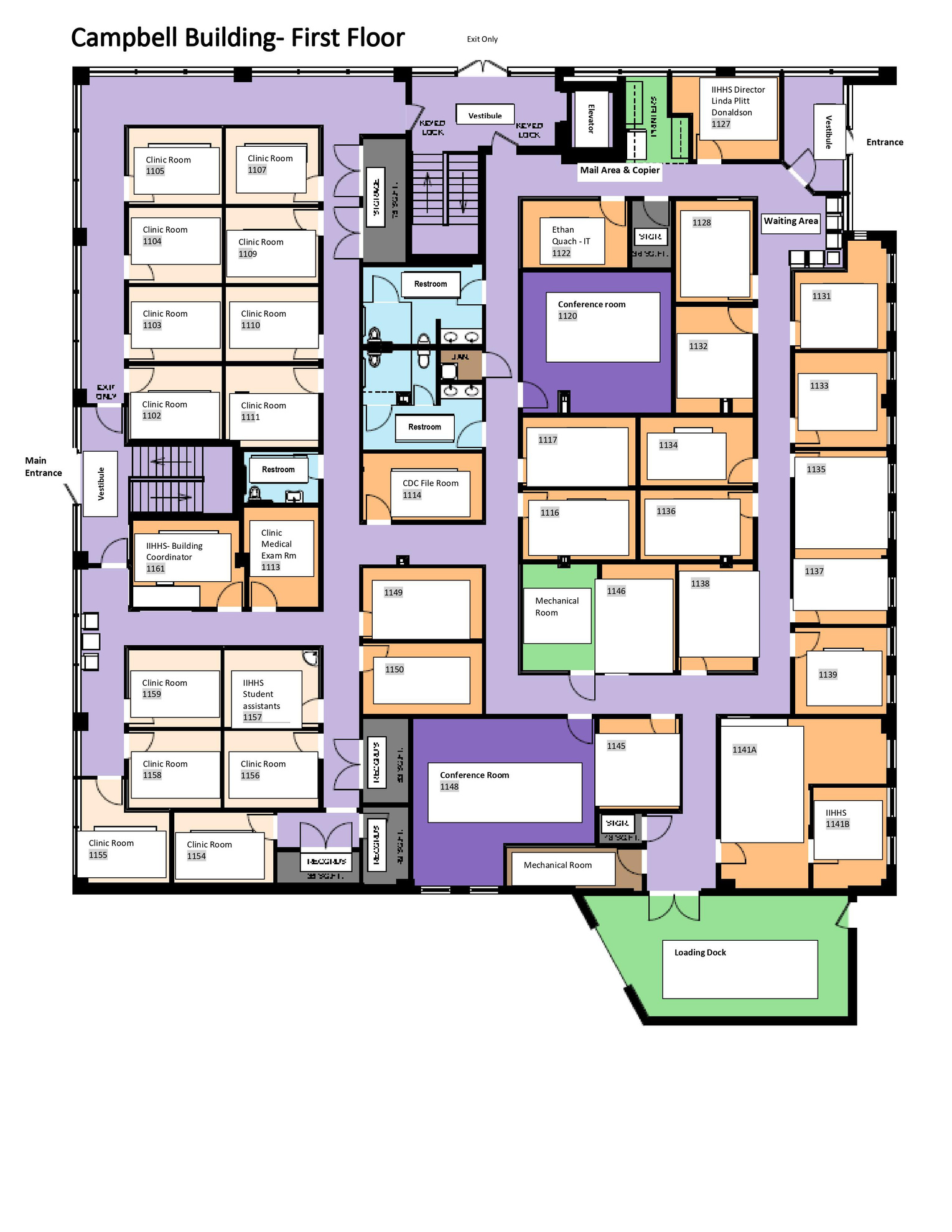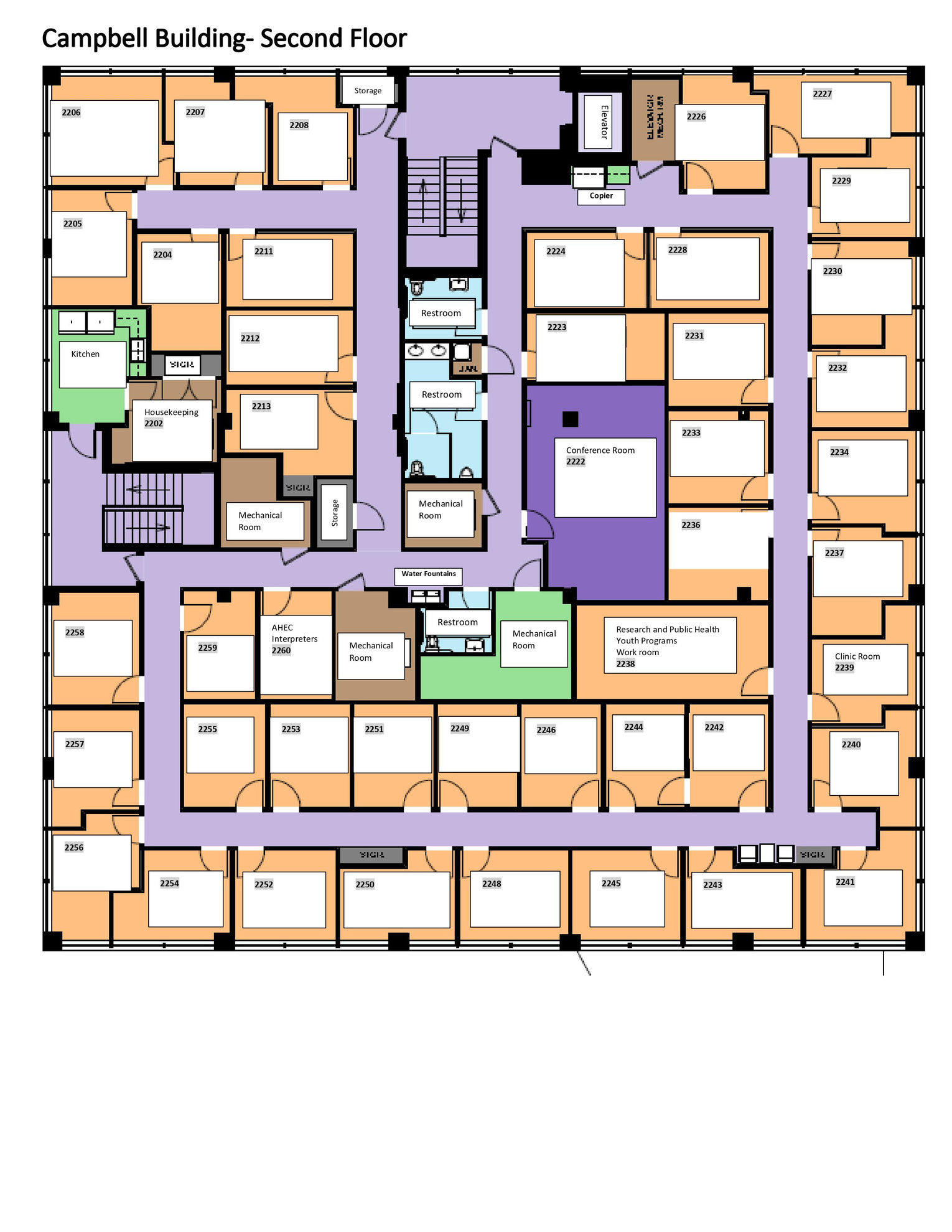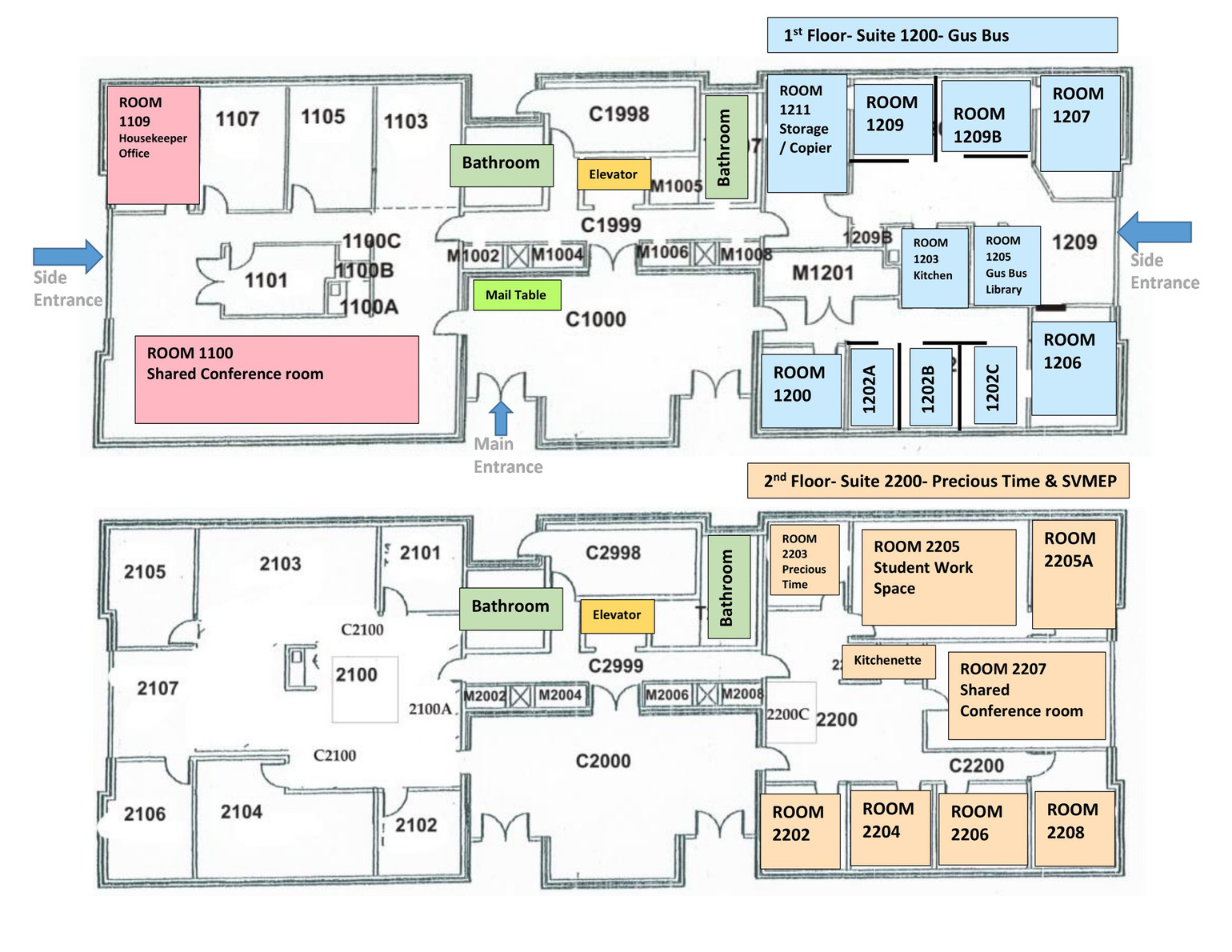IIHHS Programs
Clinics
Alvin V. Baird Attention and Learning Disabilities Center (Baird Center) develops and promotes evidence-based interventions for children with attention and learning challenges.
Audiology Clinic in JMU’s Department of Communication Sciences & Disorders' Audiology Clinic offers a variety of hearing healthcare services provided by a graduate clinician under the guidance of a licensed audiologist to the JMU & broader community.
Community Enrichment Programs
Brain Injury Connection of the Shenandoah Valley (BICSV) provides community- based services for persons with brain injury including case management, life skills training, positive behavior support facilitation, information and consultation.
The Campus Suicide Prevention Center of Virginia (CSPCVA)
provides suicide prevention training, resources and consultation to college and university campuses across Virginia.
Counseling and Psychological Services (CAPS) is a teaching, research and service clinic that offers affordable outpatient mental health services to the Harrisonburg and Rockingham County community.
Healthcare for the Homeless Suitcase Clinic provides health care at the point of contact in local homeless shelters and human service agencies through onsite primary care and case management as needed.
Interprofessional Autism Clinic (IPAC) provides in depth assessment and multi-disciplinary intervention for children ages 2-10 years old with Autism or suspected Autism.
Interprofessional Services for Learning Assessment (ISLA) offers diagnostic evaluation, consultation and support services for adults enrolled in a college or university.
Caregivers Community Network (CCN) provides respite to caregivers of those 60 years old and older while building inter-generational friendships with family members who receive care.
Futuro Latino aims to reduce and prevent alcohol and substance abuse among Latino youth and strengthen skills of youth and parents to promote a healthy Latino community.
The Gus Bus is a grant-funded enrichment program aimed at fostering a love for learning in elementary students through academic enrichment on the mobile classroom vehicles & at local schools.
Health Education Design Group (HEDG) is a leader in health education development, design, and delivery. Since its inception, HEDG has developed online trainings and educational videos for a wide cross section of health and human services organizations.
Occupational Therapy Clinical Education Services (OTCES) is a pediatric occupational therapy clinic established to address gaps in locally available services.
Rural Health Psychology Clinic promotes access to substance use disorder & mental health services, provided by advanced trainees as well as licensed counselors & psychologists in Page County, VA.
Shenandoah Valley Child Development Clinic (CDC) is committed to providing comprehensive interdisciplinary assessments for children and adolescents who are suspected of having developmental delays and/or disabilities.
Interprofessional & Interdisciplinary Education
IIHHS serves a vital role in interprofessional and interdisciplinary education through its workshops, IPE courses, and the nine clinics, most of which are shared with the CHBS academic units, that continue to provide critical interprofessional learning opportunities for our students.
Healthy Families Page County (HFPC) & Shenandoah County (HFSC) is based on a national model and provides education, resources, and support for the most vulnerable first-time parents through voluntary home visiting services.
Precious Time Pediatric Respite Program provides the families of children with disabilities an opportunity to take a break from the demands of care giving.
Promotores de Salud (Lay Health Promoters) trains Hispanic women and men to be health resource persons in their community by focusing on specific areas of concern within the Hispanic community, providing family, friends, neighbors and co- workers with effective and culturally appropriate health information.
Rural Engagement and Capacity Building Hub (REACH) facilitates faculty & student engagement with rural communities to collaboratively address identified barriers & inequities to improve health & overall quality of life.
SexEdVA aims to ensure that young people across Virginia have access to sexual health information that is positive, inclusive, evidence-based, and medically accurate in order to make informed decisions regarding their health.
Shenandoah Valley Migrant Education Program (SVMEP) provides free, supplemental education services to children and youth aged 3-21 whose parents are migrant and highly mobile agricultural workers. SVMEP also serves as a point of contact for the Hispanic Services council.
IIHHS Mission, Vision, and Inclusive Excellence Statement
The Institute's Mission and Vision
IIHHS is an interdisciplinary community-engaged hub that brings together students, staff, faculty, and the community to advance a culture of health and equity through education, clinical practice, research, innovative programs, and advocacy.
We will be a nationally recognized model for university, student, and community engagement dedicated to improving the human condition.
The Institute's Inclusive Excellence Statement
The Institute for Innovation in Health and Human Services is an anti-racist and anti-discrimination organization which is against all forms of violence and is committed to identifying and dismantling systems of oppression, racist, and discriminatory policies, practices, and processes to build healthier and safer communities where all can thrive.
Learn more about IIHHS by learning our history and organizational chart, perusing the annual report, and taking a video tour with Iggy!
IT Support and Talent Development
JMU's Talent Development Department, located on the 3rd floor of the Wine-Price Building at 752 Ott Street, offers free learning opportunities around 8 competencies: Administrative Skills, Communication, Customer Service, Diversity/Equity/Inclusion, Supervision/Management, Team Building, Leadership, and Work/Life Wellness. These workshops generally range from 1 to 3.5 hours in length and are free for JMU employees. You can find a list of Talent Development offerings here. To register for a workshop, follow these instructions:
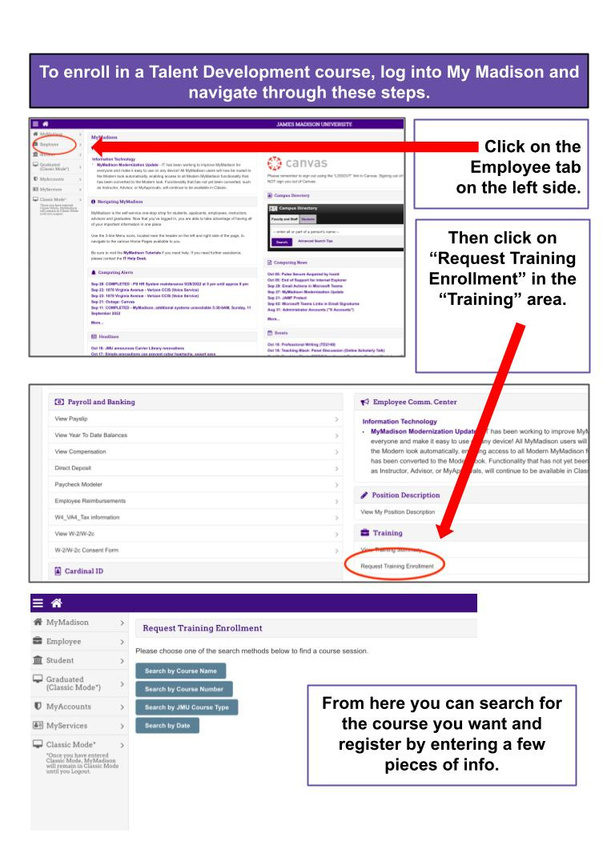
We have several options for IT support at JMU. Our IT User Support Specialist (Ethan Quach) is usually the best person to start with when you have a tech-related question or issue. If he is unavailable, the Help Desk is a good second option.
Explore JMU's Computing Quick Start page for an assortment of helpful instructions.
IIHHS IT User Support Specialist - Ethan Quach
(540) 568-8765 • quachel@jmu.edu
Campbell Building 1122
(540) 568-3555 • helpdesk@jmu.edu
Call or email for problems with your password
or basic tech support.
Request Information Systems Services with the
You will need to set up DUO multi-factor authentication, JMU's information security measure that adds
extra protection beyond username and password.
Supplies
Supply needs can range from small office supplies like file folders and Post-It notes to large items like printers. Each program has a different process related to supplies. Check with your supervisor to see if your program has a supply closet or if you should request when needed. Each program is funded differently, so be careful not to take supplies from another department.
JMU has a mandatory contract in place with The Supply Room Company (TSRC) for all office supplies. Designated staff members within each program have a small purchase credit card (SPCC) and access to our eVA procurement system. These staff members handle purchasing needs for their program.
**One important note: the University typically does not reimburse employees when they purchase things
on their own, so be sure to talk to your supervisor about any needed supplies.
Surplus Property is an option if you need gently used furniture and other miscellaneous supplies (for free!). The warehouse is open for campus staff on Wednesdays from 1:30-4:30 pm. You can also schedule an appointment by contacting the Surplus Property Coordinator.
For bulk printing or other special printing needs, contact JMU Print Services. They typically are a very cost-effective option, have very quick turnaround times, and they deliver. Be sure to talk to your supervisor BEFORE placing an order for budget purposes.
Surplus Items and the Campbell Building Loading Dock: If you have surplus items (furniture or supplies), please reach out to our Building Coordinator, Stephen Farrar (568-2642 or farrarsm@jmu.edu). Please do not leave items in the loading dock area of the Campbell Building without first talking to Stephen.
Working With JMU Students
IIHHS is the institutional expression of JMU’s commitment to community engagement and its mission to “prepare students to be educated and enlightened citizens who lead productive and meaningful lives.” IIHHS is integral to CHBS in realizing its mission “to engage students, faculty, and communities in learning, scholarship and service in health and behavioral studies to inspire responsible contributions to our world.”
We understand that the experiences students receive outside the classroom offer depth and detail to the education they experience in the classroom. We believe in the importance of community engagement as a catalyst to learning what it means to lead a productive and meaningful life. Moreover, we view the faculty and program staff who sustain the programs and activities of IIHHS as exemplars of engagement that enable others to see the power of knowledge as it is put into practice.
*Talk to your supervisor about how your program works with students.
Groups and Committees
Culture, Community & Belonging Collective | Staff Development | Communications & Social Media | Building Connections |
Committee Chair: Jolynne Bartley - bartl2jx@jmu.edu |
Committee Chair: Brenda Bechler - bechlebk@jmu.edu |
Committee Chair: Brent Finnegan - finne2bm@jmu.edu |
Committee Co-Chairs: Kris Christophel - chris2ke@jmu.edu & Jennifer Howard - howardjd@jmu.edu |
Sign up for a committee here!
Internal Resources
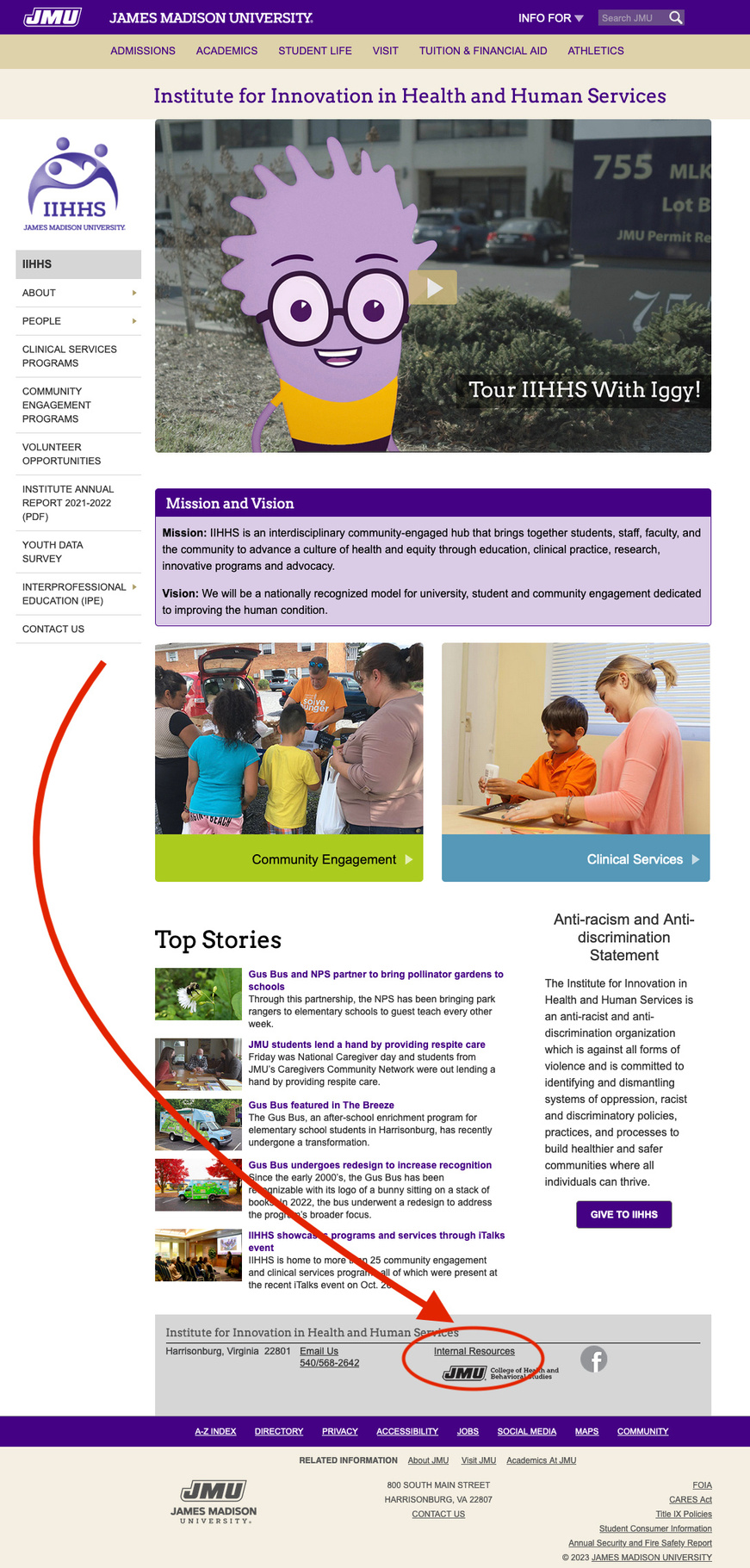
Building Access
Regular Hours: M-F 8am-5pm
Summer Hours: M-Th 8am-5pm,
F 8am-12pm
Both entrances require JAC Card access when the building is locked. Your supervisor will request access for you once you have received your JAC Card.
Evacuation Plan Maps are posted outside each bathroom and conference room, guiding you to closest emergency exits.
Campbell has one elevator.
Parking
To acquire your parking permit, navigate to the Faculty & Staff section of the parking services page. Choose Manage My Parking Account, then select Order Permit. Sign in using your EID. Once there, you can get a permit and add more than one household vehicle to your permit. Parking permission is enforced by plate number.
- Lot A (large lot)
- Lot B (smaller lot next to Hardee’s)
- Along the one-way road behind Hardee’s leading to Reservoir St.
*Be sure not to park in any spaces designated for clients.
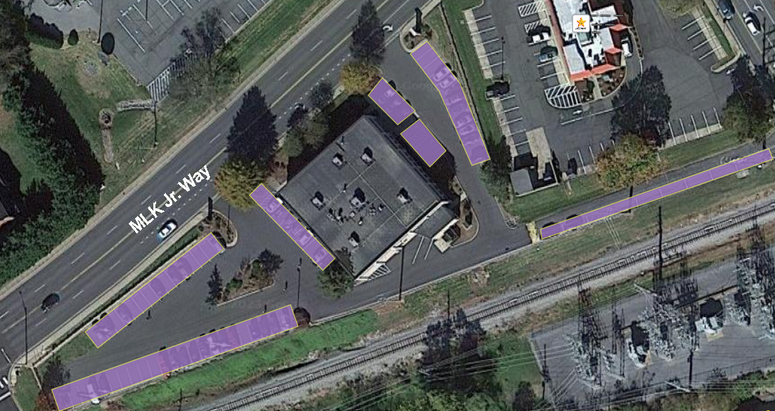
Campbell Building Parking Areas (shaded in purple)
Our kitchen space is equipped with two refrigerators, two microwaves, a Keurig coffee brewer, a toaster, and an assortment of community dishes and flatware. Please wash and put away any community items you borrow so that others may use them.
On the first Monday of each month, our housekeeper cleans out the refrigerators.
Any outdated or moldy food will be thrown out and containers will not be saved.
A water bottle fill-up station is located on the 2nd floor.
Where are the restrooms?
All restrooms accommodate wheelchairs.
1st floor
1 Male, 1 Female,
1 Family
2nd floor
1 Male, 1 Female,
1 All Gender
Photocopiers
There are two photocopiers in Camplbell. One is located in the mailroom on the first floor, and the other is around the corner from the elevator on the 2nd floor. You may make black and white copies on these photocopiers. Please be aware that certain departments buy their paper from their department funds. Ask you supervisor if your department has a stash of copy paper you should use.
The code to unlock both photocopiers is "1234." Type in the code and then make your copies as usual.
If you don't have a printer in your office and you want to be able to send print jobs to the photocopiers at Campbell Building, you have to set up user authentication on your computer. Click here for instructions on how to do this. If you need assistance, contact Ethan Quach (quachel@jmu.edu) or Stephen Farrar (farrarsm@jmu.edu).
Campus Mail
University Mail Services has scheduled runs for pickup and delivery of USPS and Interdepartmental Mail throughout the University community. If your outgoing mail is not ready by the scheduled pick-up time for your department, your staff must bring it to the Processing Center by 3:00pm if you need same day processing. Mail received at the Processing Center after the 3:00 deadline may be processed for next day delivery to the Post Office.
In the Campbell building, There are 3 drop boxes located by the copy machine on the first floor:
- Incoming Mail – all the mail that comes from Mail Services to us and gets distributed to our different mailboxes.
- Campus Mail – use a brown Interdepartmental Delivery Envelope. Include the name and MSC (mail stop code) of the person you are mailing the item to, and well as your own name and MSC.
- Outgoing (Off-Campus) Mail – if you are not using stamps, be sure to include your departmental ID number (also known as an org. number) somewhere on the envelope so mail services can charge the appropriate department. When using your departmental ID number, no postage is required. There will be a charge to your department, please get approval from your supervisor prior to sending.
Programs have an assigned mailbox in the purple cubicles on the wall, in the general vicinity of the copy machine on the 1st floor. Please remember to check the cubicles regularly for any mail or packages that might be addressed to you or your department.
You will also find a paper cutter and a laminator in the mail area.
Contact information, list of mail stop codes (MSC) and other FAQs can be found here. Learn more about JMU Mail Services with this guide.
The Loading Dock
The Loading Dock, room 1142, is used for storage, recycling, and surplus items waiting to be picked up. There are recycling bins for cardboard and non-secure paper. There's also a locked shred bin for confidential papers that can handle small amounts of paper.
Many IIHHS programs store supplies in different areas of the loading dock. If your department needs storage space, please check with Stephen Farrar to get an assigned area. Please do not leave anything in the loading dock without checking iwth Stephen first, and be respectful of other departments' belongings.
Surplus furniture is often put in the loading dock to be picked up by JMU personnel to take to the Surplus Warehouse. Occasional emails may come out offering this furniture to any who desire it for
their offices; contact Stephen Farrar for
any details.
Conference Rooms
The Campbell Building has three conference rooms that you can reserve for meetings or other program activities. All of them have computer and projection capabilities. To reserve a space, staff can put in reservation requests through the VirtualEMS system, hosted by JMU Event Management.
- All staff are registered to use the system within the first month their eID becomes active
- To learn now to navigate the system, watch the Virtual EMS Training Video provided on Event Management’s webpage.
- If questions come up, email event-management@jmu.edu.
- Requests for rooms must be made at least 72 hrs. in advance. Stephen Farrar serves as scheduler for Campbell conference rooms; contact Stephen if a reservation is needed in less than 72 hrs.
- Requests can be made for other spaces at JMU but are subject to approval by their room schedulers. A list of campus schedulers is available on Event Management’s website.
Conference Room 1148
has windows and seats up to 19 people.
Conference Room 1120 has no windows and seats up to 15 people.
Conference Room 2222 has no windows and seats up to 20 people.
Building Contacts
For immediate building requests, reach out to Debbie Bollinger directly. Debbie works with the College of Business. For non-emergency requests, work orders can be submitted via Internal Resources and will route through Stephen Farrar.
Building Access
Regular Hours: M-F 8am-5pm
Summer Hours: M-Th 8am-5pm,
F 8am-12pm
The main entrance (on the side of the building facing Sylvia’s Pets) is unlocked during the hours stated above. The other doors (on either side of the building) are locked 24/7 and require JAC access to enter.
The main entrance requires JAC Card access when the building is locked. Your supervisor will request JAC Card access for you once you have received your JAC Card.
220 University has one elevator.
Parking
To acquire your parking permit, navigate to the Faculty & Staff section of the parking services page. Choose Manage My Parking Account, then select Order Permit. Sign in using your EID. Once there, you can get a permit and add more than one household vehicle to your permit. We no longer have physical permits to display in your car; instead, parking permission is enforced by plate number.
220 University Parking Areas
- If you have a JMU parking permit, you may park in any spot in the 220 University parking lot EXCEPT the spots designated for "visitors"- parking services have ticketed permitted cars that are parked in those spaces.
- Guests to the building and those who do not have a JMU parking permit may park in the spaces marked for visitors. They do not need an additional temporary permit to use those spaces.
220 University Boulevard has kitchen amenities on both floors:
Suite 1200 has one full size refrigerator, microwave, hot water kettle, and toaster oven, located
in the Gus Bus suite. A Keurig is located in suite 1200 near the back door entrance; all staff are
welcome to use the Keurig and any of the supplies sitting on the table next to the Keurig. Pods for
the Keurig are not typically provided, so staff should bring their own to use and keep those in their office. If pods are left on the table next to the Keurig, all are welcome to use them.
When staff are sharing food, they typically leave it on the table in the kitchen for others and send out a message via email or Teams. You may also leave a sticky note on items left there if you wish to share them with others.
Suite 2200 has a shared kitchenette with a mini-fridge and a microwave. A shared coffee and tea station is set up in the hallway of suite 2200. Any items on the table are shared, including coffee, tea and sugar. Staff may also choose to keep coffee and tea in their office for their personal use and may use the mini coffee pot and hot water kettle on the table.
Picnic tables and chairs are available outside for anyone to use located near the fenced in area behind Sylvia’s Pets.
Caring for the shared space:
You are welcome to use the dishes in the drawers and cabinets of each kitchen space. Please wash any community dishes or utensils you borrow and return them so that others may use them.
Please clean out old food from the fridges regularly. Any outdated or moldy food will be thrown out.
Water fountains are located on each floor by the elevator.
Where are the restrooms?
Both floors have restrooms. The 1st floor has one male and one female restroom; the 2nd floor has two of each.
All restrooms accommodate wheelchairs.
IIHHS programs at 220 University Blvd. have access to a shared copier located in room 1211. You may make black and white copies on these photocopiers.
Personal or shared printers should be provided by your program. Speak to your supervisor about setting up your printer.
Paper cutters are located in both suite 1200 and 2200 for shared use. A fax machine is located in suite 2200 and is shared amongst all IIHHS programs at 220 University.
Photocopiers

Mail cubbies are located in the left-hand corner of the building atrium when entering through the main door. Cubbies are labeled with program names.
Outgoing mail should be placed in the mail bin sitting on the table below the cubbies. You can place stamped mail, campus mail, or mail labeled with your organizational code in the bin, and University Mail Services will pick it up.
Conference Rooms
220 University Boulevard has two conference rooms that you can reserve for meetings or other program activities. Both of them have computer and projection capabilities.
To Reserve Conference Room 1100
When setting up a meeting in Outlook, search locations and find “UNIV 1100 Conference Room.” Select this as your location. Requests for that space are routed to Debbie Bollinger. You will receive a follow-up email indicating if the reservation for the space has been accepted.
To Reserve Conference Room 2207
Request access to the 2207 shared calendar from
Jolynne Bartley. You will then be able to view the calendar and add meetings to the shared calendar for the room. If the room is already reserved on the calendar, then it would be unavailable for that time. No approval is needed; you simply add your event to the shared calendar if it is available.
Staff at 220 University Blvd. can also reserve space at the Campbell building through Virtual EMS.
Review details about spaces at the Campbell building here.
Additional Locations
The Health Place (Page County)
294 East Main Street, Stanley, Virginia 22851
The Health Place is located in downtown Stanley, VA. This space is a satellite of IIHHS and several programs work from this office:
Counseling and Psychological Services (CAPS)
Healthy Families Page County
Department of Aging and Rehabilitative Services (DARS)
Space Overview:
- Upon entering the building turn on the front light (if it is not on already) and let the others in the building know you are there. Even though there is a bell that announces people coming through the door, if you are in the back you may not hear it.
- When leaving the building if you are the last one there, please turn off the lights and make sure the back and front doors are locked.
- If The Health Place is low on supplies (TP, paper towels, soap, etc) please notify Stephen Farrar (farrarsm@jmu.edu – 568-2642), Operations Support Coordinator for IIHHS. He will purchase supplies quarterly if possible but can order more frequently for emergency needs.
- Jolynne Bartley (bartl2jx@jmu.edu) oversees the Health Place. Please copy Jolynne on correspondence related to the building, either with Stephen Farrar or Jini Cook (see below).
- Please pick up the room you have been using before you leave and empty your trash to the outside dumpster each day.
Emergencies
Please dial 911 for emergencies. Both the fire and the rescue quad are minutes away. There are fire extinguishers available in the building. Stephen Farrar is Building Coordinator (farrarsm@jmu.edu or (540) 568-2642) and Jini Cook is our JMU contact for the leased space (cookvg@jmu.edu)
Internet
- A higher speed internet was installed in the last year. Any problems with it should be discussed with Ethan Quach and/or Stephen Farrar.
- Telephone – The provider is CenturyLink, and any problems should involve Stephen Farrar.
Kitchen
No food items are to be left on the countertop, and no perishable items are to be left in the refrigerator over the weekend.
Cleaning
Andrea Good (afreshcleaning22@gmail.com) cleans The Health Place once a month. She washes windows and deep cleans the carpet periodically. Please contact Stephen if you have any questions or concerns.
Copying and faxing –
Programs should purchase and use their own paper.
Healthy Families Shenandoah County (HFSC) Woodstock Office
768 Spring Pkwy, Woodstock, VA 22664
The Woodstock Office space is generously provided by Valley Health, a longstanding partner of Health Families Shenandoah County. The office building is a small home located in a neighborhood directly behind the hospital at the end of a cul-de-sac. IIHHS programs utilizing this space:
Healthy Families Shenandoah County
Brain Injury Connections of the Shenandoah Valley
Space Overview
- A staff member will need to be at the office prior to a guest's arrival. Guests can contact Yvonne Frazier (Program Manager, frazieyh@jmu.edu) or Brittany Silvestri (Supervisor, silvesba@jmu.edu) to schedule a time. If a staff member cannot be present but has approved your visit, guests may contact Shenandoah Memorial Hospital Security (540-459-1100) to be let into the office building. If a visit is not scheduled, but a staff member is at the office, they can come on in!
- When leaving the office if you are the last one there, please turn off the lights and make sure the back and front doors are locked.
- If HFSC office is low on toiletry supplies (TP, paper towels, soap, etc), please notify Shenandoah Memorial Hospital Maintenance (540-459-1100). Hospital Cleaning Staff come every weekend to clean rooms, sanitize, remove trash, and stock supplies.
- Yvonne Frazier (Program Manager) and Brittany Silvestri (Supervisor) oversee day-to-day operations at HFSC. Please copy Yvonne or Brittany on correspondence related to the office (frazieyh@jmu.edu or silvesba@jmu.edu).
Emergencies
Please dial 911 for emergencies. Both the fire and the rescue squad are minutes away. There is a fire extinguisher located in the kitchen area of the office.
Internet-Telephone-Fax
Our internet and telephone provider is Shentel. If issues arise, we first contact Ethan Quach (quachel@jmu.edu), JMU Information and Technology personnel. If Ethan is not available or cannot resolve the issue, we contact Shentel (800-743-6835). The fax remains “on” at all times. Our answering machine is located on the front desk near the entrance.
Additional Office Supplies
Office supplies (not toiletry related) are purchased by our program. They are located throughout the office. The paper is located beside the fax machine in the kitchen area. Our copier is in the main living area. Pens, paperclips, folders, etc are located in the closet in the hallway. Our donations and home visiting tools are kept in a separate room located off of the living room area.
Kitchen
We have a microwave and mini-fridge. Please wash your own dishes after use. We have a small food pantry for participants located in the kitchen area. No open food items are to be left on the countertop and no perishable items are to be left in the refrigerator over the weekend.
Space Overview:
- The entrance to the HEDG office is marked 1070A and has the HEDG logo on the door. Because HEDG shares the building with other departments, including Mail Services, the front door remains locked for security purposes.
- Upon arrival, please call 540-568-8849 and someone can meet you at the front door.
- There is another door inside the building where the HEDG offices are located.
- When leaving the building if you are the last one there, please turn off the lights and make sure the back and front doors to the HEDG office suite are locked.
Vault Area (No kitchen)
- 1 refrigerator, microwave, hot water kettle, and coffee maker
- please wash your dishes in the bathroom sink or take them home with you to wash.
Office Supplies
- Purchased by our program
- Located in the copier area across from office 107
Brent Finnegan (finne2bm@jmu.edu) oversees the HEDG office.
Please copy Brent and Jini Cook, our JMU contact for the leased
space (cookvg@jmu.edu) on issues related to maintenance.
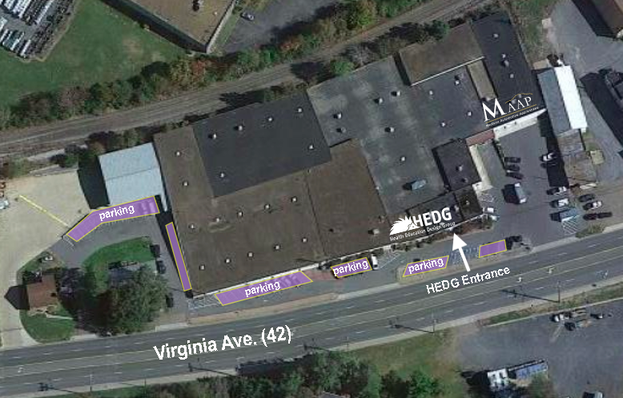
Parking available in the shaded purple areas.
Health Education Design Group (HEDG)
1070-A Virginia Ave, Harrisonburg, VA 22801
Audiology Clinic
Health and Behavioral Studies Building
MSC 4304
235 Martin Luther King Jr. Way
Harrisonburg, Virginia 22807
Occupational Therapy Clinical Education Services
131 W. Grace St., RM. 1100
Harrisonburg, VA 22807
Rural Health
Psychology Clinic
250 Memorial Drive, Suite B
Luray, VA 22835
